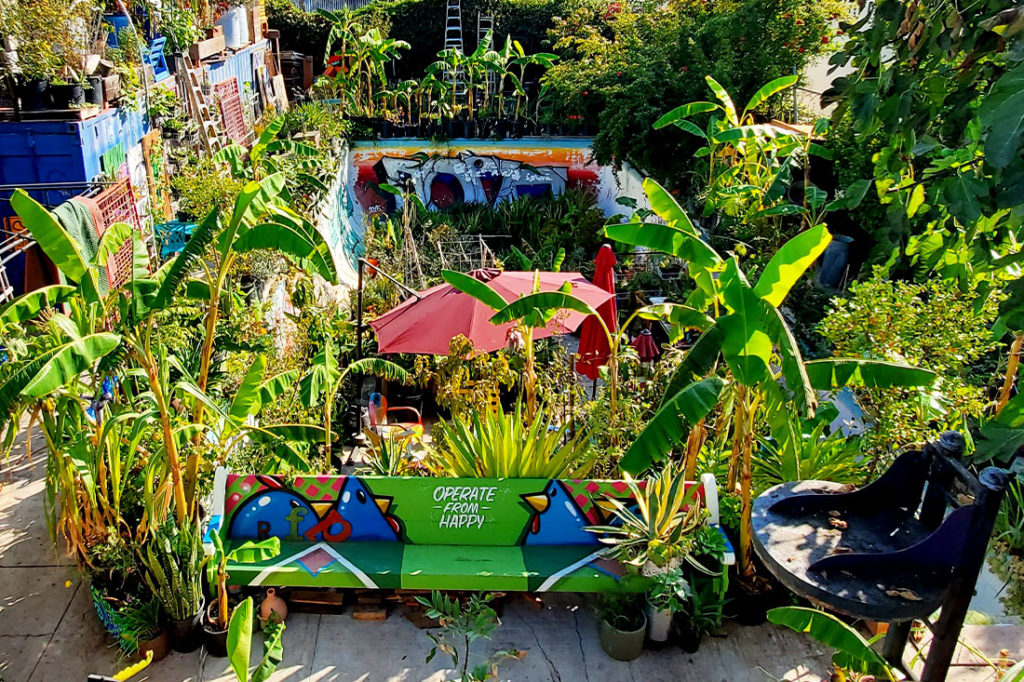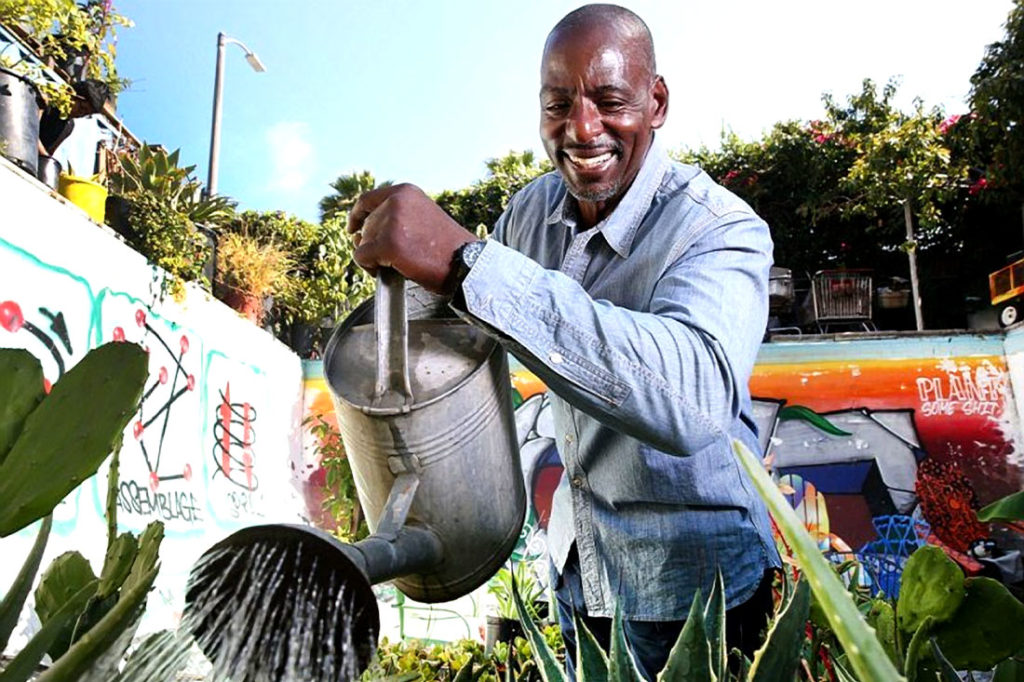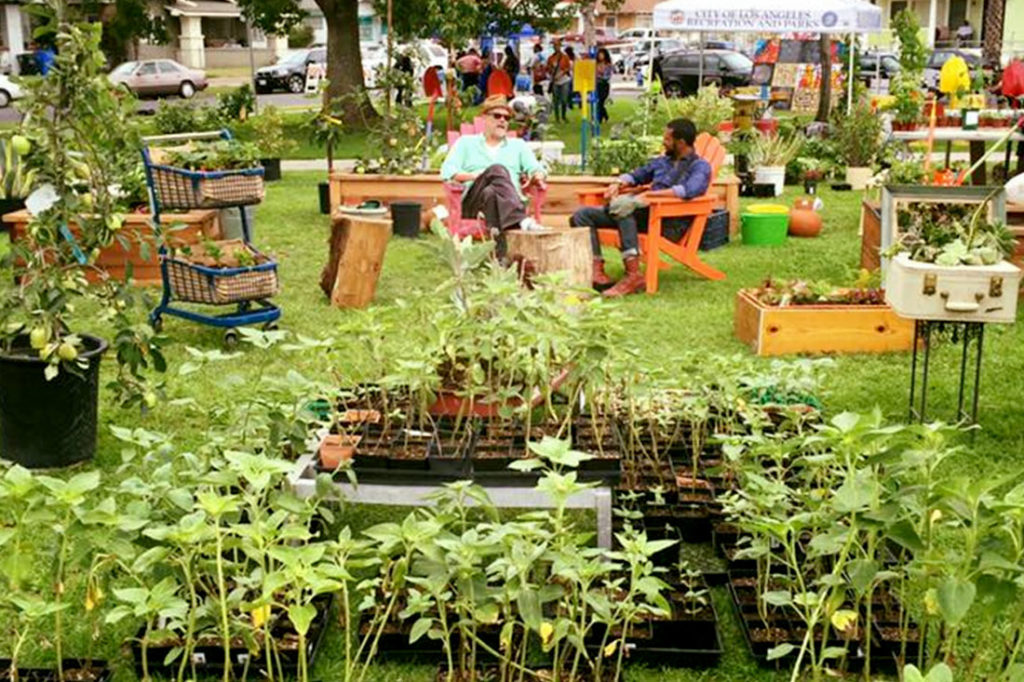Ron Finley, the Self-Proclaimed Gangsta Gardener, Found Purpose Fighting Food Poverty in South LA
Sunbathing while tending to his garden, house music playing lightly in the background while the leaves dance to the beat. His definition of success? He pauses and answers questions thoughtfully, giving off the same ease as a musician playing his biggest hit. “Waking up in the morning with nothing hurting too bad.” Has Ron Finley mastered the art of just being?
He calls himself a professional breather. “No, but what do you do for a living?” people often ask him. It’s a question all-too familiar to the frequent networker, or online dater. “I tell them I breathe for a living to make people pause so it can sink in,” Finley says. “Your job is not your life.”
Known now as the Gangsta Gardener after his 2013 TED Talk on urban gardening went viral, Ron Finley is a man on a mission that’s not for the faint of heart: to make people “give a f—.” In the age of social media and confirmation bubbles, getting people to care about something new or contrary to their existing beliefs often boils down to asking people to rewire the way they think. And so, at 8 a.m., while passersby dutifully commute to their cubicles, Finley heads to his garden and asks an inconspicuously complex question: “Why not slow down and live your joy?” And what makes that so hard to actually put into practice is precisely what Finley wants you to think about.
Finley’s questioning of the status quo began early. As a young boy with dyslexia, school was challenging because he thought, and often colored, outside the lines. Yet as others like Richard Branson and Steve Jobs exemplify, academic performance inside a classroom doesn’t always reflect someone’s true potential.
“As a kid you think something is wrong with you, but I’m glad I’m dyslexic because it made me not think the way they teach us to think,” he says. “There are all these rules. You’re supposed to follow them and wait in line, even though that other window is open. And my mind just wouldn’t get to that, because I solve things differently.”
As a teenager, Finley’s clothes never fit right, and he could not unsee how fashion specifically was not available in shapes and sizes inclusive of people of color. So he decided to sew outside of the lines, too. He set out on a path to become a master tailor, initially designing clothes for himself and friends, which eventually evolved to him founding his own line of high-end clothing called Dropdead Collexion in 1982.
“I wanted my clothes to fit so well they’d levitate,” Finley says.
In just four years, Finley’s collection was selling in boutiques and some of the largest retail giants across the country, including Neiman Marcus, Saks Fifth Avenue and Nordstrom. His work also gained enough notoriety to attract a large clientele for custom-designed pieces often seen on A-list celebrities and professional athletes alike. In spite of corporate America’s blind spot, Finley proved offering authentic representation and caring about clothing that fits diverse bodies is good business.
“But then 2007 and 2008 happened,” says Finley, referencing the Great Recession. “Stores just stopped calling. I didn’t get my dream of being a master tailor, which is sad, but I had a good run.”
What came next for Finley some might call a leap, but his transition from fashion to gardening felt like the next natural expression of his affinity for problem-solving.
He likens gardening to a revolutionary act. It’s freedom from depending on a store, a delivery app, a broken food system. However, in a similar fashion to clothing being made without people of color in mind, gardening is a freedom many in low-income neighborhoods don’t have access to—particularly South Los Angeles where Finley grew up and still resides. Because to garden you first need land, and South L.A. instead has an abundance of fast food chains and dialysis centers. In fact, one 2010 report showed South L.A. had just 60 grocery stores serving 1.3 million people, and it doesn’t look like those numbers have improved significantly in the past decade. South Los Angeles is what you call a food desert, where the closest fresh apple can be miles (and in L.A. traffic, hours) away.

Nevertheless, where others saw insurmountable problems, Finley envisioned solutions using an underutilized resource everyone has access to: city sidewalks. In 2010, Finley dug outside of the lines, too, and planted the first of now many parkway gardens in the small plot of dirt between the sidewalk and the street. The city was quick to slap him with a citation for planting food on “city property,” which escalated to a warrant for Finley’s arrest. Unfazed, he pushed for change and rallied enough signatures to pressure the city council. Nearly two years after his first parkway garden, Los Angeles updated the law in 2011 to allow Angelenos to plant food in their parkways.
Shortly thereafter, Finley founded the Ron Finley Project, a not-for-profit that empowers people across the globe to grow their own food and take back their power. Finley doesn’t pay himself a penny from what the Ron Finley Project raises and pours those resources back into the work and his community instead. The Project helps people plant their own gardens, though as Finley likes to clarify, “gardening is just the trees among the forest. It’s about more than just food.” When pressed to define his mission, Finley explained he wants to change the culture and help shift perspectives, particularly around what success looks like.

“Society sells us this idea that success is something you can own. So people believe owning things like a house or a car give you value,” Finley says. “But imagine if someone told you at an early age: ‘You are the single most important thing on this f—ing planet. There’s nothing more valuable than you, nothing more expensive than you, nothing more worthy than you, nothing more beautiful than you. That you are part of this planet and part of nature.’ Imagine if we got those lessons, how different this planet would be right now.”
Finley is not a fashion designer. He’s not a gardener. He’s a humanitarian. And gardening is just the “gateway drug” toward making some of those cultural shifts. Because ultimately what growing a plant does is show you how to care for something beyond your job, your troubles, and quite simply, care about something other than yourself.
Take the humble tomato. For $6.99 you can purchase a 12-ounce pack of cherry tomatoes—which pair perfectly with hummus—and that’s the end. Yet as Finley points out, one seed inside one single tomato can grow to become an entire tomato plant, which produces more tomatoes with more seeds capable of becoming more tomato plants. A single tomato has nearly infinite potential you wouldn’t necessarily notice if you didn’t slow down and try to grow it yourself.
It’s this new way of valuing food by its future potential that helps spark a new mindset in people. This is what the Ron Finley Project specializes in. The Project hosts a variety of workshops for children like planting and gardening, as well as pottery, weaving, composting, canning, cooking and more; and like an expertly tossed salad, each workshop is designed with specific elements that teach our youngest generation the often unseen value in things we discard.
“You can take the end cuts of celery and grow new life from it. [For composting,] even dead leaves have energy in them. If that doesn’t change your perspective, something’s wrong with you,” he says with a laugh.
Finley hopes with each workshop the children learn a deeper lesson on how to be more humane. A sign on an old church pew hangs in Finley’s garden, outlining the pseudo mantra he lives by: “Operate from happy.” It’s a message he’s raised his sons on.
“Why be miserable chasing s—? People spend their lives hustling and grinding, for what? To die? We don’t know how long we’re here,” he explains. “I’m trying to get people to stop, take a deep breath, and look around and be thankful for right now. We’re not trained to appreciate the present because there’s always the next thing. Nobody told us being happy could be part of success.”
Yet after years of a global pandemic, it feels as though the winds are carrying new perspectives from coast to coast. From marches for racial equality to the Great Resignation, all signs point to the fact that people across the world have indeed slowed down long enough to take stock of their lives and are more mindfully determining what kind of ingredients they want to cook with moving forward. Finley smiles: “They’re waking up.”

For those hungry for change in their own communities, Finley shares some advice: Be patient, keep at it and remember things are not going to transform overnight. If history is any barometer, progress ebbs and flows, and requires steady and unwavering effort. But the great thing about cultural changes: Everyone can push the movement forward from a different lane. You don’t need to garden, though it’s certainly a tasty way to affect change. You can think differently, choose to move in kindness, and find something—big or small—in your own community you can improve upon. It all matters.
“Grow your own life,” Finley ultimately says. “Design the life you want to live and not the one that’s been designed for you. Don’t let society measure what success looks like for you.”
This article originally appeared in the May/June 2022 Issue of SUCCESS magazine. Photos by Lucy Hewett and Leroy Hamilton.
The post Ron Finley, the Self-Proclaimed Gangsta Gardener, Found Purpose Fighting Food Poverty in South LA appeared first on SUCCESS.
from SUCCESS https://ift.tt/LxWSpei
Comments
Post a Comment